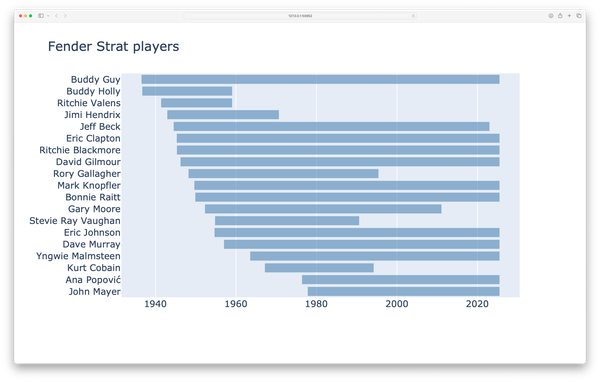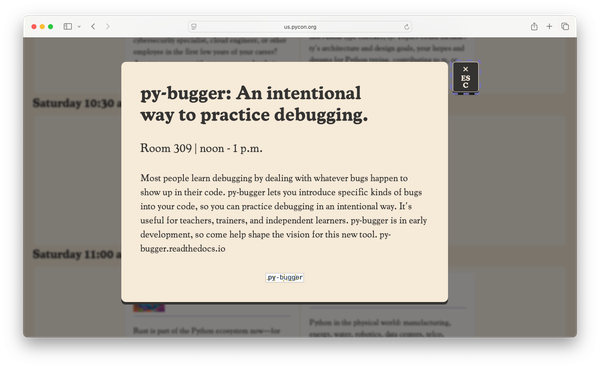PyCon US talk proposals are open for one more week
MP 70: If you're considering speaking, please submit a proposal!
PyCon US will take place next May in Pittsburgh. The Call for Proposals (CFP) is open through next Monday, 12/18. Preparing a talk takes a lot of work, but submitting a proposal shouldn’t take too long. If you’ve considered submitting a proposal, you’ve got one week left!
If you’re not familiar with the proposal process, I’ll highlight some of the most important things to be aware of.
Proposal deadline
The deadline for submitting a proposal is 12/18, “Anywhere on Earth”. If you haven’t heard this phrase before, it’s a way of defining deadlines so that no one has to think about time zones. If it’s still 12/18 anywhere on Earth, you can still submit a talk proposal. Practically, that means you have until next Monday night to submit a proposal, no matter where you are in the world.
Proposal resources
There are a number of resources on the PyCon US site that are relevant to speakers. Here’s a rundown of the most important pages, and what kind of information you’ll find on each:
- PyCon US home page: An overview of the conference.
- Proposal guidelines: An overview of the kinds of proposals you can submit. Also includes a timeline for the proposal process.
- Proposing a talk: Suggested topics, topics to avoid, and other advice about making a proposal.
- Submitting a proposal: Directions for actually submitting a talk proposal.
Kinds of talks
There are several kinds of proposals you can submit:
- Talks: Most talks are 30 minutes, although there are some 45-minute slots for important topics.
- Charlas: There’s a Spanish track at PyCon US called Charlas. If you speak Spanish, even if it’s not your first language, consider submitting a Charlas proposal.
- Tutorials: You can propose a 3-hour interactive workshop for one of the days preceding the main conference. These are a tremendous amount of work, and are compensated.
- Posters: You can propose a poster that will be on display during part of the conference. There’s also a designated time for people to meet with you and discuss your work.
What to talk about
PyCon is a wonderful event in no small part due to the balance that the talk committee aims for, and usually achieves. Their goal is to have a full range of topics in the talks that are chosen. There are technical talks at the beginner, intermediate, and expert levels. There are context-focused talks, where people share what they’re using Python for in their paid work, academic work, and volunteer work. There are numerous presentations about longstanding and newer open source projects.
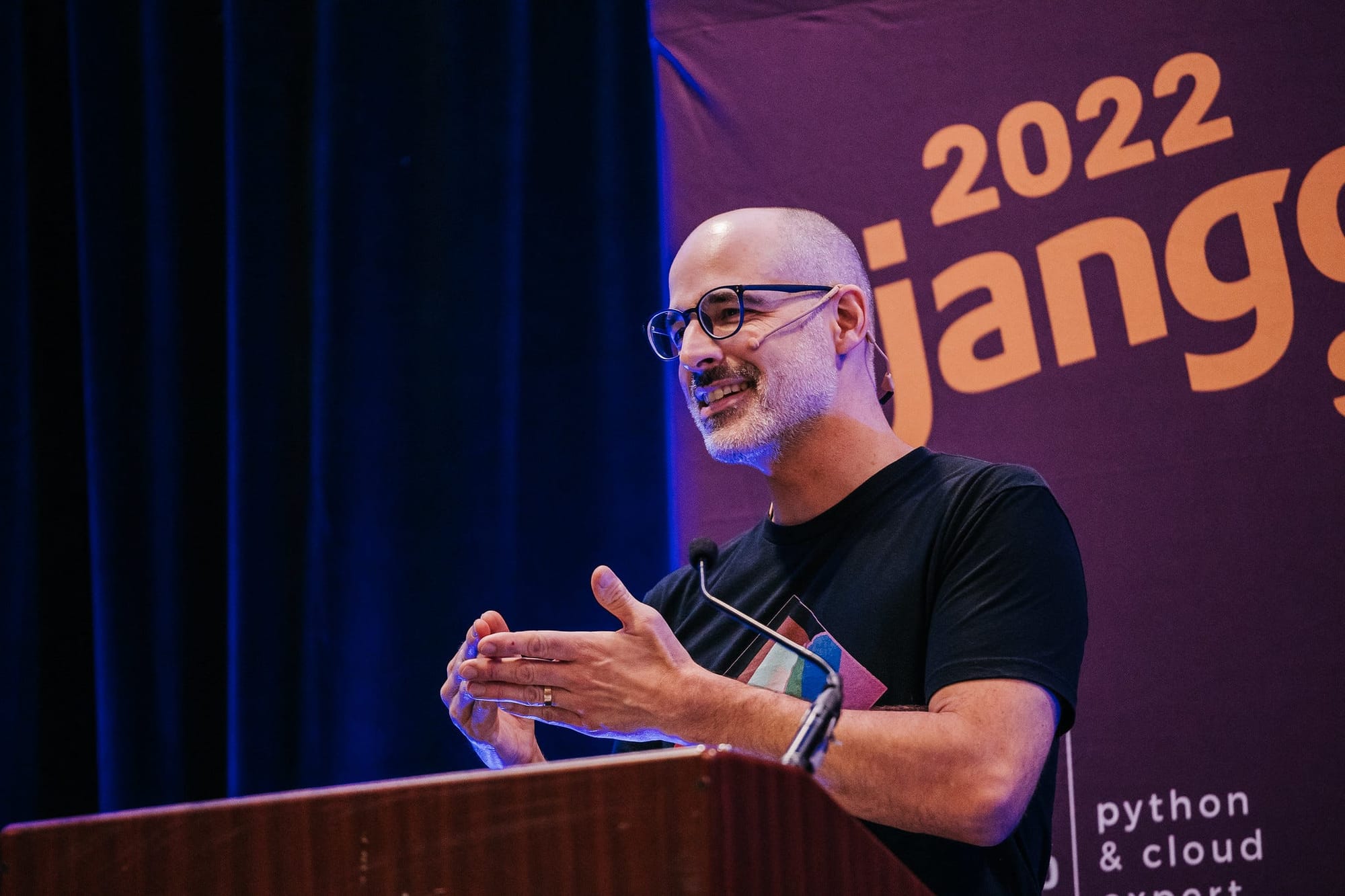
In short, if you’re doing something you find interesting with Python, please consider submitting a proposal.
One thing I’d love to see discussed next year: How are people using AI assistants in real-world projects? There have been plenty of discussions about how AI assistants respond to specific prompts. But what is it like to do your daily professional work with whatever AI assistant you use? What is it good at? What do you avoid using it for? What changes are you seeing in it over time? Is their consensus on your team about how to use (and not use) AI assistants?
People are also tired of hearing about AI, so if you have a specific topic to discuss that has nothing to do with AI, please submit that as well!
Drafting a proposal
Once you have a topic in mind, you can draft a proposal. The PyCon website has a portal for submitting a proposal. It’s helpful to know the sections you’ll be asked to fill in before starting your proposal. Some of these are public, and some are kept confidential between you and the conference organizers.
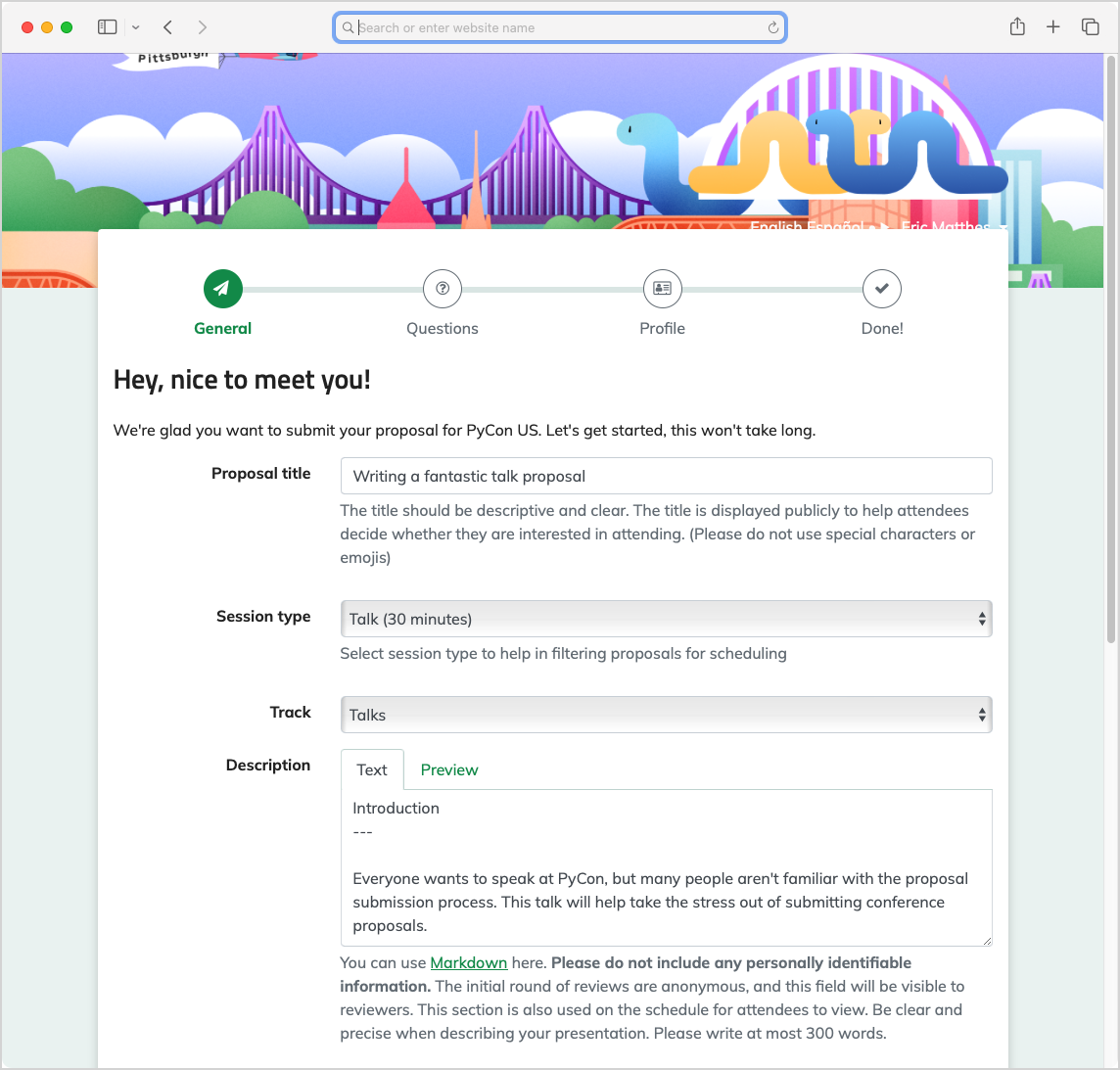
If you want to submit a proposal, you’ll need to fill in the following sections:
- Title: A one-line title for your proposal.
- Session Type: For example, a 30-minute talk.
- Track: This is basically the same thing as the Session Type.
- Description: A public description of your talk. It’s in Markdown, and you can use up to 300 words.
- Notes: Any additional information you might need to share with organizers. This is not public.
- Additional Speaker: You can co-present a talk if you want.
- Outline: Provide a rough outline of what you aim to present, and how long you’ll spend on each part of the talk.
- Category: There are about 30 categories to choose from. Some examples are Applications of Python, Data Science, DevOps, Security, etc.
- Audience: Choose from four main audience descriptions: Just starting out, Some experience, Advanced experience, Community presentation. This is meant to help attendees choose appropriate talks to go to.
- Link to Slides: You can provide a link to your slides ahead of time if you want to, and the audience can follow along during your talk. This link is not public until after your talk has been accepted.
- Have you previously given this talk? If so, the organizers would like a link to the relevant information.
- Recording release: This allows PyCon to record talks, and share them online after the conference is over.
- Resources: You can upload resources that you want attendees to have access to. I believe this is mostly used for tutorials.
This might look like a lot, but it’s what the review committee needs in order to figure out which talks are well-thought out proposals, and which are just quick ideas that might not actually lead to a good talk. It also helps them put together a well-balanced talk schedule. The most important parts are the description and the outline; the rest are important things to know, but quick to fill in.
Note: Keep in mind that the first round of reviews are blind; reviewers will not see your name during the initial review process. This policy was put in place to keep the focus on the contents of the proposal, and avoid overemphasizing well-known speakers. Make sure you don’t include any personally identifying information in your proposal’s description.
Don’t fear rejection!
PyCon gets a lot of proposals, and the review committee needs to put together a balanced schedule of talks. You can submit an amazing proposal about how dictionaries work in Python, and if five other people submit similar proposals, most of those will have to be rejected.
There are many really good proposals that end up being rejected because of overlap like this. Many well-known and popular speakers have been quite open about how many rejections they’ve received; if your talk is rejected, please don’t feel too discouraged. You can always resubmit your proposal for a later conference.
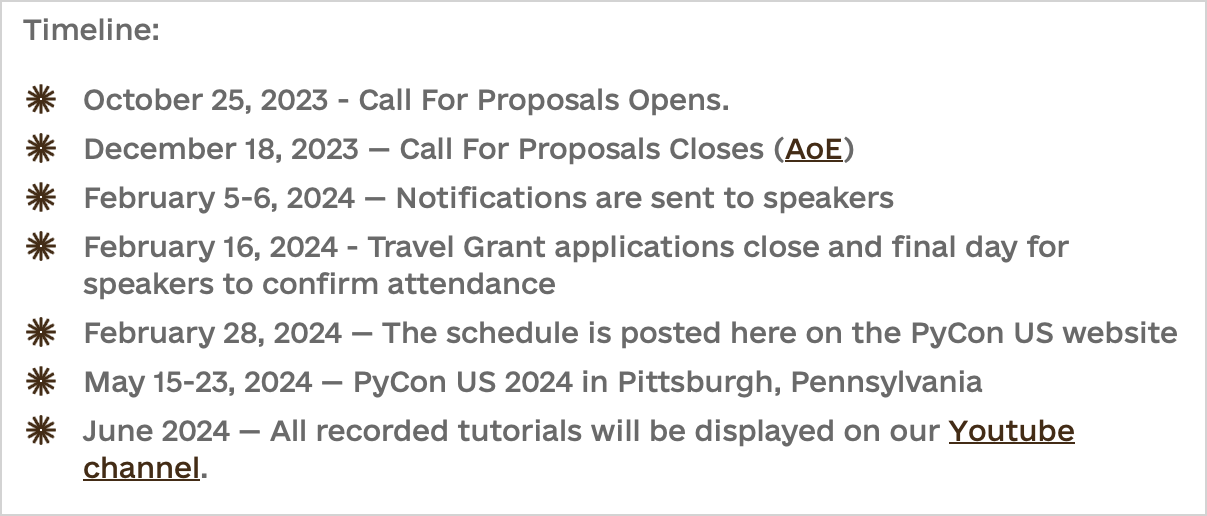
Other thoughts
There’s a few more things to keep in mind if you’re considering submitting a proposal:
Be clear and specific
The review committee is looking for reasons to accept your talk, or at least move it on to the second round of reviews. Give them all the information they need to make their decision, without writing up a full script for the talk.
You can submit multiple proposals
Because there’s a bit of luck around whether other people are submitting a talk on a similar subject, it’s perfectly acceptable to submit more than one proposal. However, it’s much better to submit one quality proposal than several lower-quality proposals.
You can save a draft
You can save your proposal as a draft. It’s actually good to fill in all the boxes, and come back a day or so later to look over your proposal before submitting it. Just remember to come back and follow through on submitting!
Don’t submit an ad
PyCon is a well-established conference, and no one wants to go see an ad for a for-profit project, or for the company somebody works for. If you want to share an interesting aspect of a commercial project, that can be appropriate. Just don’t submit a proposal that’s a thinly-veiled ad.
You can share a preview link with someone
It can be helpful to have someone else look over your proposal. While you can copy-paste parts of your proposal into an email, you can also share a link to a preview of your actual proposal.
Conclusions
If you’ve never submitted a proposal before, it can seem like a daunting process. But if you have a clear sense of what you’d like to present, it shouldn’t take too long to draft a proposal. It’s mostly a description of less than 300 words, and an outline showing you have a sense of how long you’ll spend on each major topic in your presentation.
I can’t promise a close review of proposals this close to the deadline, but if you want a quick check-in about an idea or a proposal, I’m happy to share my initial reactions. I’ve given one talk at DjangoCon, so I’ve been through this process. I’ve also had talks rejected, so I can commiserate if your proposal isn’t accepted. If you want some quick feedback, feel free to reply to this email with your thoughts.
If you submit a proposal, I wish you luck. :)
